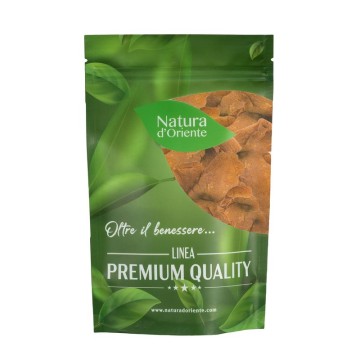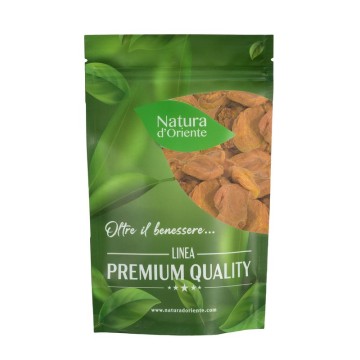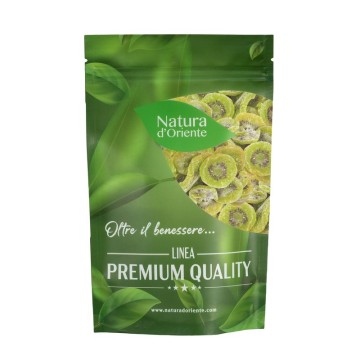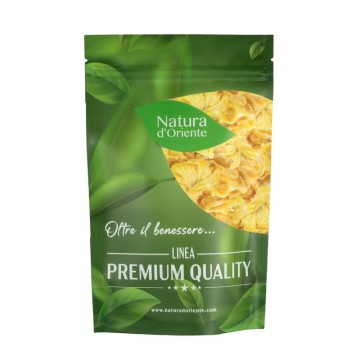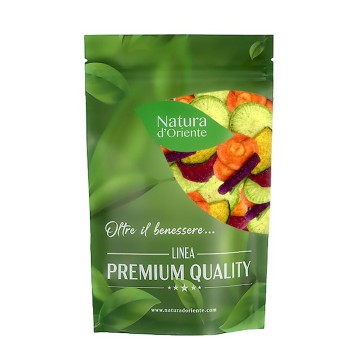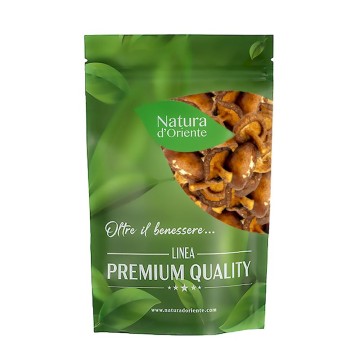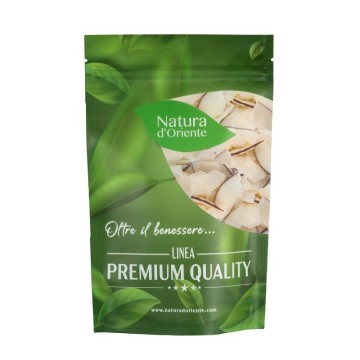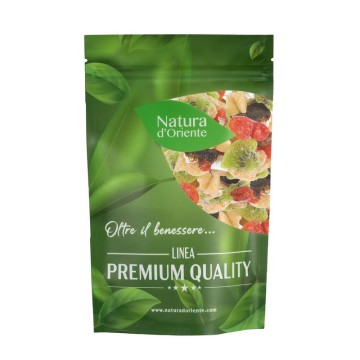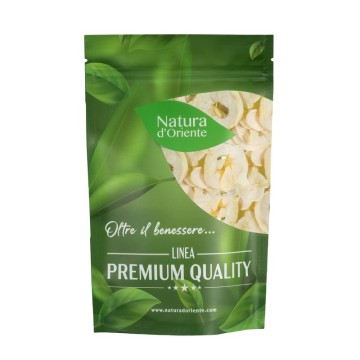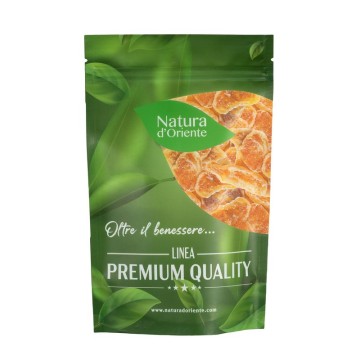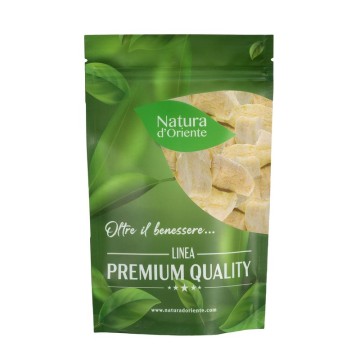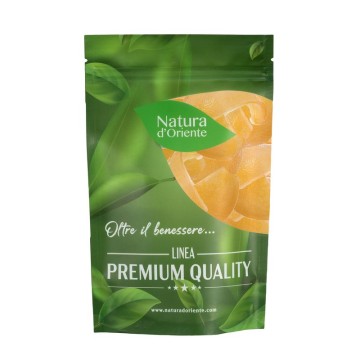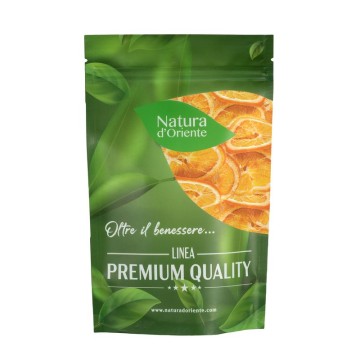Medjoul Gold Dates
An exotic fruit, typical of southern Africa and western Asia, which is appreciated for its goodness but also for the nutritional properties it presents. Let's find out what they are...
Dried dates: properties and benefits
The date is a fruit that contains many vitamins, including vitamin A and beta-carotene, substances that help the body counteract the presence of free radicals, responsible for 'aging. Furthermore, this vitamin is important for the well-being of sight and precious for the skin. In addition to vitamin A, they are rich in vitamins of group B and vitamin E, beneficial for the functions of our body.
In terms of antioxidants, Medjoul dates contain flavonoids and polyphenols, important tannins, known for their properties to support the well-being of the human body, in addition to lutein - a substance that protects the eye from damage resulting from exposure to sunlight and blue light.
This type of dried fruit also contains many fibers, which help the body to counteract constipation, promoting intestinal transit (insoluble fibers), as well as reducing cholesterol absorption (soluble fiber); an element that favors the regularity of blood pressure.
For those with the classic "lazy intestine", the fibers of dried dates help reactivate the normal functions of peristalsis, with emollient and soothing properties of the digestive system, which can prevent appearance of hemorrhoids and colitis. Dates are also useful with a drainage action on body fluids to improve the functionality of the urinary tract.
The pulp of the dates contains various simple sugars, useful for those looking for energy foods, and for sportsmen their contribution is excellent, especially in the version of sweet dates with no added sugar . Those who lead a very active life can benefit from the energetic properties of dates, but also those who are in a state of debilitation or underweight.
Even when you find yourself in cold situations, a few dates a day can help the fluidity of bronchial secretions.
Medjoul dates contain important minerals such as potassium, calcium and iron. We know how important calcium is for bones and teeth, while potassium is useful for the nervous system. The sodium-potassium exchange is beneficial for our balance: for the correct functioning of the muscular and nervous system, and for correct hydration in the presence of perspiration after physical activity or during the hot season. Furthermore, the sodium-potassium balance helps the well-being of the cardiovascular system and correct blood pressure.
Like several types of dried fruit, dates also contain a good percentage of copper, which is essential for the transport and use of iron in the body, and for the enzymatic reactions that help the proper functioning of various organs.
Origins and History of cultivation
The date palm tree comes from African and Middle Eastern territories, and is considered by some historians to be among the first plants cultivated by humanity. Already in ancient Egypt as dried or fresh fruit, the date was highly appreciated for its sugar content, (70%), and for the presence of nutrients, which today we know are mineral salts and vitamins. The ancient Romans used dates to flavor wine, to prepare desserts, and to produce alcoholic beverages through their fermentation.
On a symbolic level, the plant was considered important, and if in the imperial era a palm branch was given to the great actors and gladiators, the scene from the Gospel in which Christ enters a Jerusalem celebrated with palm leaves (since then, it is referred to as Palm Sunday). In the medieval period in Europe the date palm spread more, brought to Spain and Sicily during the Arab invasion. The date was present as a fruit served at the end of lunch, and as a fundamental ingredient of elaborate dishes such as cakes and pies, perhaps combined with other savory ingredients.
They were always present on the tables of kings and nobles, and this particular date won the titles of King of Fruits and Diamond of Fruits. Historical is the Palm Grove of Elche, in Spain in the province of Alicante, declared a World Heritage Site by Unesco forand its beauty. Over half a million palm trees are found here, making it the largest palm grove in Europe. It is also called Palmera imperial in honor of the visit of the Empress Elisabeth of Austria-Hungary, the famous Sissi, in 1894.
Today, when we consume them in the form of dehydrated fruit without sugar, dates come from crops in different parts of the world, from the Maghreb to the United States.
Medjoul variety dates, from Palestine, are sought after because they are large and have a rich pulp, a unique soft texture. Medjoul dates are considered one of the most full-bodied and valuable qualities of this dried fruit.
Plant and Fruit
The date palm, Phoenix dactylifera, belongs to the Arecaceae (Palmae) family. Its roots are highly developed, to recover water even in the depths of the driest territories, and it can reach heights of up to 30 metres. The berries of the palm, the dates, are very sugary and nutritious, they come from large clusters of red fruits, which turn brown when they ripen.
The name date comes from the Greek daktilos (finger) and comes from its typical shape. The fruits are born only after the eighth year of life of the palm, which reaches full maturity after thirty. Dried dates are due to a drying process already known in antiquity, which makes them an excellent dehydrated fruit without sugar.
Nutritional values of Medjoul Dates
Medjoul Dates have a caloric intake that should always be taken into consideration, since they provide 268 Kcal for every 100 grams. Among the various types of dehydrated fruit, the dates of this variety make available different proteins (3.3%), mineral salts and vitamins, low fat (0.2%) soluble and insoluble fibers (around 7%). In sweet dates without added sugar, we find good values of vitamin A (149 IU), beta-carotene (89 µg), Vitamin K and many of the B group. In particular vitamin B3 or Niacin (about 1.60 mg i.e. 8.9% of the RDA), vitamin B5 (0.805 mg or 13.4% RDA) and vitamin B6 (0.249 mg or 12.5% RDA). This dehydrated fruit also contains various amino acids and the vitamin substance lutein.
At the level of mineral salts, they provide essential nutrients such as calcium (64 mg), potassium (696 mg), magnesium (68 mg), phosphorus (62 mg), iron (about 1 mg), copper (0.362 mg), zinc (0.44 mg), manganese (0.296).
How to consume dried dates in the kitchen or as a snack
As dried fruit, dehydrated dates can be eaten inserted in sweet recipes or perhaps in savory appetizers. Dried fruit is often eaten as a hunger-busting or energy-busting snack, and sweet dates with no added sugar have the advantage of being excellent snacks for calorie-controlled diets. In particular, Medjoul dates are defined as natural candies due to their softness and sweetness.
Dehydrated fruit without sugar is perfect for adding to fruit salads, yoghurt, smoothies, vegetable milk, ice cream or to create dried fruit mixes. Furthermore, dried dates can be included in the preparation of energy bars useful for sportsmen.
Dried dates: side effects and contraindications
There are no particular contraindications to the intake of dried fruit such as dates, but a possible intolerance to the food must be kept in mind. Furthermore, the correct quantities in the intake of dates should not be exceeded, otherwise there is a risk of a laxative effect. A contraindication of dried dates concerns people who are very overweight, or who suffer from diabetes, due to the presence in dried fruit of numerous sugars - with the risk of increasing blood sugar levels - even in the case of pregnancy or breastfeeding diabetes.
In terms of dental hygiene, caution is advised since the fruit can stick and settle between the teeth with their pulp, facilitating the bacterial colonies that lead to tooth decay.</p >
![]()

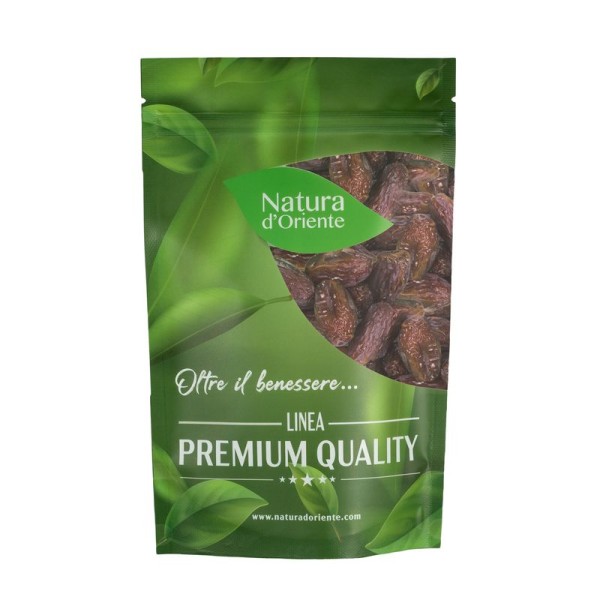









 No reward points for this product.
No reward points for this product.



